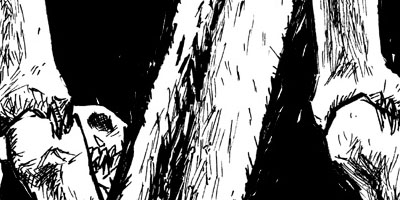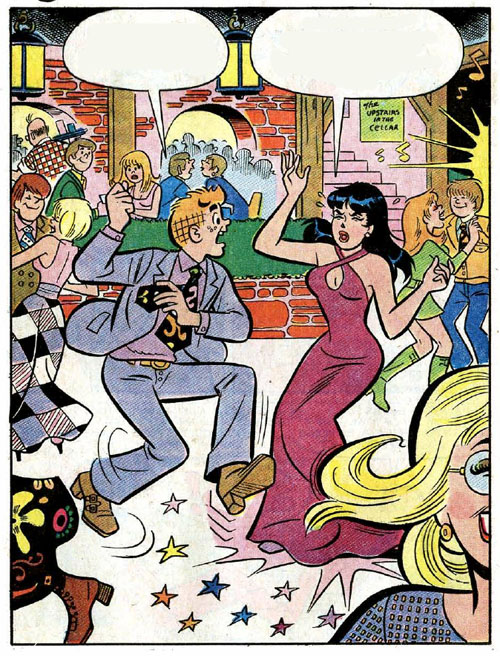
6
Aug
Machine of Improved Archie
Posted by MGK Published in Archie (Improved Or Otherwise), Comics, Interactive Fun Time Party
2
Aug
Back in 2007, when I was writing about the death of the original Green Goblin, I described how shocking it was to see him die in the classic “Death of Gwen Stacy” storyline. I pointed out that he was impaled on-panel, just to make it clear that he was really dead and there wasn’t going to be a last-minute cheat to allow the character to survive. “Except that there was,” I then said, “some twenty years later, but we’ll save that for another long, angry day.”
That day has arrived, but I’m not really angry anymore. Marvel’s doing its thing and I’m doing mine. But I did want to explain why it was a mistake to bring back Norman Osborn, and along the way give my answer to why Norman isn’t Spider-Man’s arch-nemesis (although I should note clearly here that this is entirely separate from any answer MGK might give, and that he reserves the right to give his own answer at some future point. He’s nice enough to give me a guest spot here, but I don’t speak for him.) But let’s start with the resurrection of Norman Osborn. (After the cut, because this is kind of a long one.)
31
Jul
Wonder Woman is such a hard character to get right, because on the one hand, "superhero", and on the other hand, "boobs". Right? So tricky.
— Andrew Wheeler (@Wheeler) July 30, 2013
I retweeted Andrew Wheeler’s rant about how sexism plays a role in people saying Wonder Woman is hard to write well (there’s more at his Twitter, it gets scathing real fast) because he was mostly right: there is often some misogyny involved when people say they hate Wonder Woman or think she is boring. It’s comics fandom, you have to assume there’s some soupçon of misogyny in the base more often than not.
But.
Wonder Woman is hard to write well, because there is no definitive Wonder Woman. I’ve written about this before, but think about it for a second. There’s a definitive Batman, now: he’s been arrived at over decades. There’s a definitive Superman, a definitive Spider-Man, and we’re only just starting to hit definitive Wolverine over the past few years and even then there have been mis-steps.1 Definitive Daredevil took, what, 180 issues until Frank Miller showed up? So it can take time. In Wonder Woman’s case it has taken over sixty years and counting.
Like: Who’s a “must” member of Wonder Woman’s supporting cast? Supporting casts are important: they define your character’s milieu (assuming they aren’t a lone wolf like Wolverine is). Superman has Lois and Perry and Jimmy; Batman has Alfred and Dick and Commissioner Gordon; Spidey has MJ and Robbie and Betty and Flash and Jolly Jonah. Who’s Wonder Woman’s supporting cast all-stars? Etta Candy? Only shows up occasionally and has no definitive role. Steve Trevor? Hasn’t been prominent for years, even decades. I-Ching? Please. And so on.
Alternatively, who are Wonder Woman’s most notorious villains? Look at this list of Wonder Woman “adversaries” from Wikipedia:
Angle Man, Ares, Baroness Paula Von Gunther, Badra, Bizarra, Blue Snowman, Captain Wonder, Cheetah, Children of Ares, Circe, Cyborgirl, Dark Angel, Decay, Devastation, Doctor Cyber, Doctor Poison, Doctor Psycho, Duke of Deception, Egg Fu, Eviless, Genocide, Giganta, Hades, Hypnota, Jinx, Mask, Mavis, Osira, Queen Clea, Queen of Fables, Shim’Tar, Silver Swan, Superwoman, Tezcatlipoca, Trinity, Veronica Cale, Villainy Inc., White Magician, Zara
So, to sum up: Cheetah, Circe, Ares and Hades? Maybe Dr. Psycho, but then again Dr. Psycho is a character better known for his stint in Villains United than for his classic Wonder Woman stories. Really, this is not the most inspiring list. Of all of those characters, I think Ares ends up being Diana’s archenemy by default mostly because he’s always been the most powerful, but there is no definitive Ares/Wonder Woman story like there are Batman/Joker or Superman/Luthor or Spidey/Doc Ock2 or even Wolverine/Sabretooth, for crissake.
But then again there are no definitive Wonder Woman stories, are there? There are plenty of good runs on the title. I mean, if you do a list of everybody who wrote more than two years’ worth of Wonder Woman comics, you get:
William Marston
Robert Kanigher
Gerry Conway
Martin Pasko
Dan Mishkin
George Perez
William Messner-Loebs
John Byrne
Greg Rucka
Gail Simone
Brian Azzarello
That’s a goddamn Murderer’s Row of comics writing talent right there – and I’m not going to do the “well William Marston only gets in because he invented the character, because really he was just a weird pervert” because those old Marston comics show a real understanding of the form.3 And then you go into all those great writers who didn’t have long runs on the title: Mike Sekowsky, Len Wein, Alan Heinberg, Phil Jimenez, Walt Simonson. Wonder Woman is a title that DC has always made sure had serious talent working on it. So where is the Wonder Woman equivalent of “Year One”> or “For The Man Who Has Everything” or “The Boy Who Collected Spider-Man”?
I should note I don’t think this is simply a failure of marketing, either, or of DC failing to properly promote groundbreaking stories. All of those great writers wrote decent Wonder Woman stories, and DC over the years has made valiant efforts to publicize them and the character generally. Despite a lot of attention and a lot of talent, we’ve never really found what makes Wonder Woman work, and for the most part the result is every time a new writer gets their hands on it they revamp whatever they like, be it turning Diana into a martial-artist spy without powers, the Avatar of Truth, an ambassador from a very very foreign country or the secret daughter of Zeus. This isn’t just a new spin on the character each time, either: Superman as capricious trickster in the Silver Age, Superman as TV reporter in the Bronze Age, Superman as humble, lovable family man in the Whatever-This-Is Age and Superman as Bloggerman in the New 52 are all still identifiably Superman: Clark Kent, who is also Kal-El from Krypton, last survivor of a dead race, and so on.
But if you took no-powers martial artist spy 1970s Wonder Woman, 1990s George Perez Wonder Woman and current-day daughter-of-Zeus Wonder Woman, and gave them different names, they’re barely the same character. Different powers, different origin stories, they’re really different people when you get down to it. There is no definitive Wonder Woman story because there is no definitive Wonder Woman, and that means every time a writer gets an idea about how to make Wonder Woman relevant they tear down whatever they want to get rid of, which is often something another writer spent time building up. Writing a Wonder Woman series is not unlike building a sandcastle, when you get right down to it, and about as stable.
This matters, because people seek out given comics because they’re looking for a particular reading experience more often than not (Batman: gritty noir; Spider-Man: adolescent angst; Wolverine: revenge drama; etc.). If you pick up a random Wonder Woman comic you have no idea what it’s going to be about, because everybody’s idea of Wonder Woman is different; there is no such standard as a “good Wonder Woman story” (as opposed to simply “a good story,” which is in part why Man of Steel was so divisive in comics fandom).
And realistically this is not going to change until a Wonder Woman movie comes out, because when we get a Wonder Woman movie, that will hard-define the character in a way that no comics event realistically ever will (much like Robert Downey Jr. has defined Tony Stark for the next few decades at least). Brian Azzarello’s current run on the character (what I have seen of it, because I don’t read DC comics any more) is good stuff and inventive, but not enough people are reading it for it to make a dent in comics fandom’s collective understanding. It’s going to take a movie, and the self-fulfilling prophecy of “well, nobody will go to see a Wonder Woman movie, so we’re not going to make one” is presently getting in the way.
- Remember that Jeph Loeb run where Logan was one of a race of werewolf-things? What happened with that? It sucked, I remember that much. [↩]
- Otto is Spider-Man’s definitive arch-enemy. Period. Green Goblin – no, not even close. [↩]
- Granted, which Marston then used as his personal and weird masturbation aid, but that is neither here nor there. [↩]
29
Jul
Mark Gruenwald was one of those wonderful, mad, quixotic people who actually wanted the Marvel Universe to make sense. Obviously, he was aware that there were limits to this dream; in the real world, people cannot turn into solid steel simply by willing themselves to do so, or stick to walls with their bare hands because they have “spider powers”. But he wanted the fiction of the Marvel Universe to operate according to an internally consistent set of rules that applied to all its stories. It’s an impossible dream, unfortunately; the laws of drama trump the laws of physics in a fictional universe, and Gruenwald’s explanations of time travel and the structure of the Multiverse held together only as long as he was around to hold other writers to them. But the explanations he came up with were more than just a set of rules. They were a set of stories.
‘Quasar’ was the series he came up with to tell those stories, and I loved both ‘Quasar’ the series and Quasar the character. I loved the series because Gruenwald looked at the Marvel Universe, the grand patchwork creation of hundreds if not thousands of hands, and saw infinite vistas to explore. Tiny little loose ends that most other fans forgot about, like the Chief Examiner in the ‘Questprobe’ video game tie-in comics, he saw as a chance to tell a story that was waiting for someone to do it justice. Forgotten characters like the Stranger or Maelstrom were interesting and compelling when seen through his eyes, and he couldn’t wait to show you why. The endless strangeness and vast complexities of the Marvel Universe, with its gods and gods-above-gods and gods-above-gods-above-gods, he used as the backdrop to tell stories that showed that universe in all its glory.
And Wendell Vaughn, the main character of the series, was exactly who was needed for it. He wasn’t the most interesting of protagonists; he was staid, solid, dependable and calm in a crisis. He wasn’t damaged or angry or broken inside. But he was nice. He was likable. He tried to do the right thing all the time, even when it hurt him–heck, even when it killed him, which was significantly more often than you might expect from a character who carried his own series. (I think he’s died at least four times, but I might be missing a couple. For Wendell Vaughn, death is like a coffee break from being Protector of the Universe.) He was a guy who had his shit together and acted like a hero, and that’s gotten to be rare enough in comics these days that I think it’s worth celebrating in and of itself.
And the stories were great. The Watchers fell victim to a devastating meme that killed them in their hundreds. Oblivion killed the embodiment of all life, leaving Quasar to protect its successor. Quasar slipped sideways out of our universe entirely, winding up in the New Universe and meeting the possessor of the Star Brand. All sorts of weird, crazy, goofy concepts that went to the forgotten corners of the Marvel Universe and brought back all sorts of treasures to share. Mark Gruenwald put his heart into this series, and it really showed. I’m still hoping for an ‘Essential’ collection, now that they’re finally getting up into the Eighties, because I really do think of this one as essential reading for anyone who wants to feel like being a comic fan is worth something. For all that pedantry can (and does) devolve into pointless point-scoring and petty bitching over “getting it wrong”, there’s a flipside to it. There’s a way of caring about these things that’s positive, that uses the questions of how the Marvel Universe works as a springboard to inspiration. Mark Gruenwald wrote from his passions as a fan his whole career, and ‘Quasar’ showed exactly why that was something to love.
29
Jul
Deadpool & Deadpool & Deadpool & Deadpool…
Posted by Jim Smith Published in Comics, General Nerd CrapSomebody asked the chief a rather loaded question about Lobo and Deadpool being “overplayed, really-limited-joke” characters. And frankly, I don’t think that’s fair to Deadpool.
Let’s set aside the tragic aspects of the character here–that Wade Wilson has a lot of emotional baggage that he can’t escape because he can’t die, that sort of thing. That’s all well and good, but I’m just talking about how the character works in pure farce. In that context, Deadpool’s problem isn’t that he’s limited as a joke character. It’s that people are limited in how they make jokes with the character.
This was already on my mind since I recently saw a gifset on Tumblr of Deadpool’s WACKY ADVENTURES at SDCC. It struck me that in each gif, somebody was doing something amusing with cosplay or props or whatever, and the sole contribution of “Deadpool” was to enter the scene and play along just like any other fun-loving convention-goer might. So you’ve got people cosplaying as Tetris blocks, which is kind of interesting I guess, and then OH MAN DEADPOOL IS WITH THEM NOW IT’S HA-HA-LARIOUS~!~!! XD XD
I get this same vibe from Deadpool’s appearances in comics–at least, the comics that are played for laughs. Deadpool is fighting ninja mimes because it’s funny, and it’s funny because it’s happening to Deadpool, and Deadpool is funny because it’s happening to him. It’s circular logic that only makes sense if you accept that Deadpool is some sort of humor-enhancer, who by his mere presence makes funny things funnier.
If humor were food, Deadpool would be the “bacon strips & bacon strips & bacon strips…” meme. Because let’s face it, bacon doesn’t actually make everything taste better, and even when it does there are diminishing returns as you add more. The first time I tried to make a sandwich with more than one layer of bacon, I ended up with a crispy-chewy mess that wasn’t at all what I hoped for. But the idea of extra bacon is indulgent and tempting. So we assume Epic Meal Time knows what they’re doing when they wrap a pork roast in a four-layer quilt of bacon, even when we should have the common sense to know better. Similarly, fandom seems to have been conditioned to assume that once anyone attempts to work Deadpool into something, it must be funny because Deadpool.
It’s not that bacon or Deadpool is bad, but the trick is in how you use them rather than simply using them at all or a lot. Wade is probably pretty versatile as a joke, but if Marvel and Deadpool fans forget to tell the joke, he is extremely limited as a punchline.
29
Jul
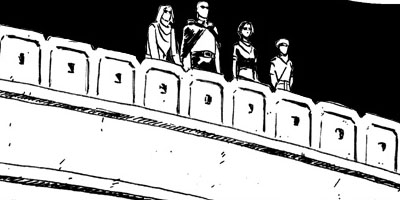
Click on thumb to see full
As always, you can also go to the dedicated Al’Rashad site.
25
Jul
From last week’s open house:
Mike From Nowhere: 2 Man 2 Steel is going to feature Lex Luthor and they’ve talked about businessman-genius Luthor. (It’s not official, but come ON.) How best to translate Luthor to the big screen?
I endorse the Luthor-as-super-Renaissance-man concept that works the best. Luthor is a super-genius scientist AND a super-businessman AND in top physical condition, because he is driven to excel at all things. It makes him the ideal opponent for Superman – the man who can do everything versus the man who can do anything. Also it means he can wear his power suit, by which I mean “a really nice suit,” which has always been Luthor’s most intimidating look. (The battlesuit overcompensates.)
John: Your Dr. Strange series has been amazing. Any chance you’ll do (or even a few one-shots) of “I Should Write Superman”? Or what you would do if you had a year’s run of Action/Superman/some other similar book?
In the first place, the reason I liked doing the Legion ones and the reason I like doing the Dr. Strange ones is because both of those properties let one play on the fringes of their respective universes, which is great. This is not to say that there are not tons of Superman minutiae which are fun, but everybody has their list of Superman minutiae they would bring back in a comic in a new and improved form (like when Kurt Busiek brilliantly re-imagined the Prankster, for example). There is a long, long lineup for Superman – and the Avengers, and Batman, and the X-Men, and Spidey, and so forth – and that leads itself to a certain sort of conservatism and a little less freedom to experiment with tone.
Or, to put it another way: my prototype for an extended run on a corporate property is more along the lines of Jason Aaron’s Ghost Rider run. Think that level, rather than Superman.
(Also, I would be terrified of writing Superman. I have no idea how people summon the hubris to write it.)
Aussiesmurf: What’s your favourite in-continuity story for each of the following characters that DOESN’T significantly affect the status quo :
1. Batman
2. Superman
3. Spider-Man
1. “Blades” by James Robinson and Tim Sale in Legends of the Dark Knight
2. “The Miraculous Return of Jonathan Kent” by Cary Bates and Curt Swan in Action Comics
3. “The Thousand” by Garth Ennis and John McCrea in Spider-Man’s Tangled Web
JayDzed: Which is the most overplayed, really-limited-joke character in mainstream comics, Deadpool or Lobo?
Lobo, because Deadpool can be used for more jokes. Lobo is only really good for Alan Grant/Keith Giffen style over-the-top violent satire. Deadpool has wider range.
23
Jul
A few people both in last week’s open call and subsequently via email asked me for my opinion about Superior Spider-Man, and I think it’s probably one of the best comics Marvel’s put out in years,1 if only because it’s really incredibly daring on a number of levels and directly in opposition to much of the new paradigm Marvel has put forward for its superheroes over the past few years. Which, really, is what a good Spider-Man comic should do, but Superior Spider-Man is putting a knowing and even satiric slant on the whole thing.
Firstly, let us acknowledge that Marvel killed off Peter Parker. Not just sorta-killed him off, either: they’ve killed Peter as comprehensively as you can really kill a flagship character, and did it the right way by having his greatest enemy, Doctor Octopus, invade his body, destroy his mind, and steal his life.2 And they didn’t just kill him: they killed him, left a window in order to enable his return where he was sort-of-surviving within Otto-Spider-Man’s mind, and then killed him off in that. Which was both shocking and thrilling, because subverting the standard comics resurrection paradigm – even if we all know it is only temporarily – is kind of great.
But what’s really great about Superior Spider-Man is that it is, on a subtle level, active criticism of many Marvel comics’ current top-down model of heroism, where the heroic protagonist does What Is Necessary For The Greater Good. (See: Iron Man, Nick Fury, Cyclops’s renegade X-Men, the Illuminati, and so on and so forth.) And it’s trying to do so from as sympathetic a portrayal of Otto Octavius as is possible: we’re constantly reminded that Otto, before becoming a supervillain, had a really screwed up and horrible life, and he actually wants to do the right thing and be a hero. The problem is that because Otto has no faith in people’s inherent goodness (which is a very Spider-Man thing to have), it informs his entire approach towards being a hero, which is to completely control every situation: by installing spy robots all over New York so he can know in advance where to be heroing, by blackmailing Mayor Jonah so that he can install a base of operations, occasionally killing a baddie because if he didn’t then the baddie would have just killed more people – and now he’s assembling what is for all intents and purposes an army of henchmen, and he’s doing it because he thinks this is how good guys should be good guys because it’s more efficient (and he’s not wrong about that).
Going into D&D alignment terms, it’s very much a Lawful Evil approach to being Lawful Good; Otto’s flaw isn’t that he doesn’t want to do the right thing. He does. The problem is that Otto doesn’t understand what the right thing actually is. Which makes it an excellent tragic comics story, because while Otto is the antihero of this story, he’s an extremely compelling one. It’s just great superhero comics all around, and given the gravitas of what’s happening I’m amazed how well it works as an all-ages story.
And yeah, I think this eventually gets resolved by having the Ultimate Universe get destroyed by 616-Galactus (as was foreshadowed in “Age of Ultron”) and Miles Morales managing to escape to 616 and then defeating Otto-Spidey to become the new Amazing Spider-Man, because that would be kind of great3 and just as bold a story choice as the entire Otto-Spidey Saga was in the first place.
- And really, Marvel has put out a whole ton of good comics over the past few years, so that says something. [↩]
- Yes, Peter will be back eventually. Probably it will involve Mephisto in some way, because why not. Let us all take a moment to acknowledge that after semi-rebooting Spider-Man to end his marriage in order to tell all the stories they couldn’t tell with a married Spider-Man, the single best idea they had was “hey, let’s kill him.” [↩]
- Not least because the usual suspects would flip out over Spider-Man now being a blackity blackity black kid. [↩]
22
Jul
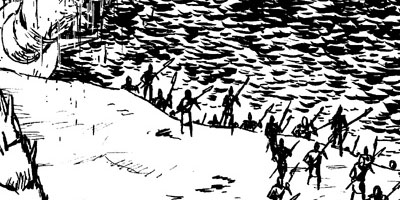
Click on thumb to see full
As always, you can also go to the dedicated Al’Rashad site.
19
Jul
There’s nothing comics fans love like “badasses”. Wolverine, the Hulk, the Punisher, Batman…all of these characters’ popularity depend on their ability and willingness to kick ass in a fight. Anytime someone wants to take an obscure character and make them into a fan favorite, their first step is to give them a “take no prisoners” attitude and a lot more combat prowess. And even within the fictional universe, the fighting abilities of these characters are respected and feared by villains and heroes alike. Every villain knows that when Wolverine shows up, Shit Gets Real. Likewise, their opponents are badasses-by-proxy; if Sabretooth can take on Wolverine in a fight, he must be one tough customer despite the fact that Spider-Man once defeated him by tricking him into clawing his own face off.
But there are plenty of characters out there who don’t have any kind of reputation as “tough” customers, despite the fact that they could easily murder their way through the entire Marvel Universe faster than you could say “personality change by authorial fiat”. Here are five characters whose abilities make them scary enough that villains should pray they never get a personality transfusion from the Punisher.
1) Kitty Pryde. Kitty is mostly portrayed as a cute teenage kid, a skilled computer hacker, and a ninja with neat infiltration skills and a mostly defensive array of powers. But in any kind of actual physical fight…she can’t be hit, she can’t be hurt, and she can kill you instantly. All she has to do is take an object, any object, phase it, stick it inside your chest cavity or skull, and let go. Thud. Alternatively, she can phase a person, let them sink into the ground up to their chest, and let go. Not only do you die, but your final moments are unspeakable agony as your entire nervous system is now completely integrated with foreign matter.
2) Invisible Woman. Sue Richards can create an invisible, solid object in any shape she wants. She can make it hard enough to stop a speeding car (you know that if she was a supervillain, she’d totally do this just for kicks) and thin enough to cut through human flesh. She can expand it, and she can contract it. And she does not need line of sight to use it. The number of ways you could use this power to murder another human being are limited only by the imagination. Doctor Doom getting on your nerves? Create a cylindrical force field that forms a seal over his eye, then extend it out to create a partial vacuum. The Hulk bothering you? Wait until he exhales, then create a force-field in his esophagus. And the Wizard’s anti-gravity powers don’t sound so impressive when he’s flying through an invisible maze of razorwire.
3) Iceman. Honestly, I never understood why Scott Lobdell needed to make up new powers for Bobby when he wanted to show how he wasn’t using them to his full potential by having the White Queen take over his body. The guy has the power to instantly freeze things, and human beings are mostly water. Do you really have to pretend that he could always turn into ice but just never figured out how in order to show that he could be a tough customer? To say nothing of the fact that ices is heavy and hard. Even if you weren’t interested in killing someone subtly and undetectably by freezing their heart solid in their chest, you could make a big flashy statement by dropping a giant icicle on their heads.
4) The Human Torch. Actually, this is one of those characters whose most astonishing achievement is that he’s never killed anybody purely by accident. His principal power–hell, his only power–is to unleash a torrent of insanely hot fire at things. The degree of control he exerts on a daily basis to avoid inadvertently murdering not just people but entire housing tracts really shows you what an amazingly good person he is. If he ever decided not to be that good, I really don’t think many characters could survive an encounter with him. (Except for the Invisible Woman, who could murder him easily. See above.)
5) Storm. Most of the time when the X-Men get into a fight, Storm mainly just flies around and shoots little zap bolts at people. Occasionally she’ll hide the team with fog or toss around a little freezing rain to make bad guys uncomfortable. Whereas in fact, getting into a fight with Storm should be about as safe as juggling nitroglycerin. The upper limits of Storm’s weather control powers haven’t ever really been tested. Can she create 70 MPH straight-line winds? Can she generate a lightning bolt that contains 15 million volts of current and superheats the air around it to 100,000 degrees Fahrenheit? Can she cause a torrential downpour, causing an instant flash flood? Can she create an EF5 tornado, capable of devastating an entire city? Who knows? Pick a fight with her when she’s in a bad mood, and you may be the first to find out? (Thor also falls into his category, but usually people treat him like a badass. Mind you, they tend to be more respectful of his ability to hit things with a big hammer than his ability to steer a hurricane into Long Island.)
None of this is to suggest that I really want to see these characters turn into Wolverine-esque murderous “tough guys”. For one thing, the stories would be pretty short if they used their powers to their full potential. (“Oh, no, Magneto’s back! He’s going to…die, because Kitty Pryde just snuck up behind him and materialized a log through his head. Well, what’s on TV?”) I’m mainly trying to say that characters shouldn’t be idolized solely based on how easily they can win a fight. Because if you think Wolverine’s a super-impressive tough guy, try to remember that he wouldn’t last five minutes in a fight with a teenage girl.
17
Jul
Out in the garden where we planted the seeds there is a tree as old as me
Posted by MGK Published in Comics, I Should Write Dr. Strange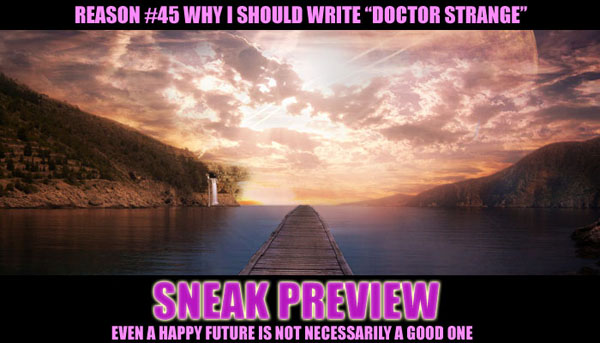
Sorcerers Supreme, as a rule, do not retire. “Defender of all reality” is not a job that is particularly conducive to packing it all in and moving to a condo in Florida, in the first place, because it has a remarkably high dying-on-the-job rate. People who become Sorcerers Supreme are disinclined to retire anyway; the sort of person who is right for the job never really stops being right for the job until they are disqualified from it by reason of end of life. (Even the ones who are total bastards. Especially the ones who are total bastards, really.)
Most Sorcerers Supreme, when you get right down to it, become Sorcerer Supreme because they were never truly meant to be anything else, and thus there isn’t any point for them to not be Sorcerer Supreme; the acceptance of the job is simultaneously the acceptance of one’s own mortality, along with a bit of general foreknowledge that it when it comes, it will probably be rather violent. In fact, there are no recorded instances of Sorcerers Supreme fully retiring to give the job to the next fellow in line. Even the Ancient One died in battle against Shuma-Gorath (he pretended to retire and give Stephen the job, but really he was taking care of many things his pupil wasn’t yet ready to handle, much as a parent lets their child swim on their own while keeping their hands close by in case they need to rescue them from drowning).
Which is why it comes as such a surprise, during a particularly relaxing series of mediations, when Stephen Strange finds himself in the future. That bit of it isn’t particularly surprising – the magical powers of the Vishanti which he has mastered do allow for time travel and one does occasionally wander, not unlike puttering through an engaging farmer’s market and coming across a country cheese stand you have never seen, except instead of cheese it is time. (Which also helps with cheese, incidentally, but that is another thing entirely.) So finding himself in the future is not that odd. Even finding himself is not that odd. (At least, not to Stephen Strange.)
But what is odd is that Future Stephen is retired. And not Ancient One retired; for real retired. He gardens. He does his t’ai chi every day, to ward off the stiffness of old age. He does the odd bit of mystical consulting because once superheroes learn that they can ask you questions they never really stop doing it, even if nowadays it’s Spider-Girl and American Dream asking the questions. He has tea twice a week with the new Sorcerer Supreme (whose identity he refuses to divulge: “look, when I realized who it was to be, I was distinctly surprised, and I think that was important”), and tells his protege about the importance of extra socks often.
He speaks with his daughter on the phone every day, and he dotes on his grandchildren.
All of this of course makes Current Stephen extremely suspicious, because he’s not a damned idiot. Here Is Your Blissful Future is somewhere in the first half-dozen pages of every would-be conqueror’s guide to sidelining a Sorcerer Supreme, after all, and he knows as well as anybody that his job doesn’t really allow for this sort of future. At best, you get the satisfaction of having kept things from going to hell, and that has to be enough. But Current Stephen does test after test – he knows every possible way someone could fool his senses and he knows how to nullify or counter every single one of them. And every one comes up empty. For every test Current Stephen knows, and even a few he improvises, says the same thing: this is real, this is no trick, this is your beautiful house and your beautiful life, this is what you get.
And that is when Future Stephen – who, since he is Current Stephen plus time, is even harder to fool than Current Stephen – poses a question:
“If this is real – and let us assume for the moment that it is, since I think I am quite tangible – then we accept that this is unlikely. But it is also unlikely that you would see this for no reason. Which leads us to ask: who gains by having you come to this particular now? Are they your enemy, seeking to sideline you with the fear of potential? Are they mine, hoping to eliminate you in a future you cannot be prepared for? Or perhaps does someone wish to ensure that this particular iteration of your future never comes to be – or, indeed, definitely comes to be?”
15
Jul
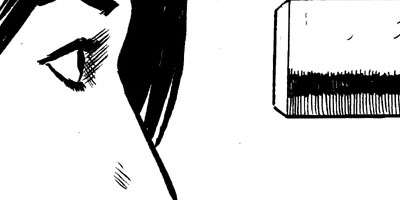
Click on thumb to see full
As always, you can also go to the dedicated Al’Rashad site.
9
Jul
I love, I love, I love my magical girl, each and every day of the year
Posted by Jaime Weinman Published in ComicsSo in the last month, I’ve been trying to read more superhero comics than I ever did before, trying to give myself a crash course in an art form I should have followed when I was young, but didn’t. (So please remember this in light of what follows, and make allowances for the narrow, American-corporate-comics scope of this particular binge.) I read more comics than the doctor’s recommended dosage, with the result that I now announce everything I’m going to do before I do it, and talk grimly about hard choices without moving my mouth. Apart from catching up on the expected mix of brilliant work and not-so-brilliant work, and becoming convinced that thought bubbles are eventually going to make some kind of comeback, I was able to get into the best part of comics reading: finding characters you like and following them. (That’s why Marvel and DC will never go completely out of style: they may be reworking a lot of characters created decades ago, but their artists and writers-for-hire created so many characters that you can always find some you like.)
And in that free-associative way that only a blog post can excuse, it got me to thinking that one of my favourite types of character is the one who has the initially lame powers, who doesn’t get to fight a lot, and maybe doesn’t seem quite at home in superhero comics – the magical woman. Or the reality-altering woman. Or the woman who isn’t super-strong or super-fast, but somehow makes things happen. Call her whatever you will, I likes her.
There are lots of female characters with supernatural powers, but there are at least three who come to mind when I think of this kind of character and why she’s not quite at home in the superhero/action world: Jean Grey in X-Men, Wanda the Scarlet Witch, and – at least after her powers were redefined to include force fields and other stuff – Sue Storm, the Invisible Girl of the Fantastic Four. All three were early Lee/Kirby/Marvel creations. All three were supposed to give some female interest to superhero comics; all three started out with powers that seemed unimpressive to action-comic fans. Jean is probably the definitive version of this character: she looks, acts and talks like a character from one of Lee or Kirby’s romance comics (actually, she resembles that other Marvel redhead, Patsy Walker, but without that weird quasi-religious vibe Al Hartley gave to Patsy), a perfect and spunky young woman, adored by all men – including, creepily, her much older mentor Professor Xavier. She’s not there to be an alternative to the usual
continue reading "I love, I love, I love my magical girl, each and every day of the year"
8
Jul
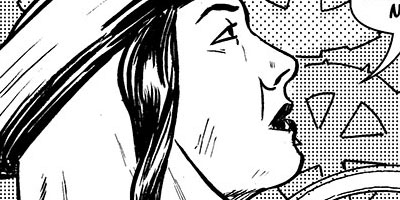
Click on thumb to see full
As always, you can also go to the dedicated Al’Rashad site.
Search
"[O]ne of the funniest bloggers on the planet... I only wish he updated more."
-- Popcrunch.com
"By MightyGodKing, we mean sexiest blog in western civilization."
-- Jenn
Contact
MGKontributors
The Big Board
MGKlassics

Blogroll
- ‘Aqoul
- 4th Letter
- Andrew Wheeler
- Balloon Juice
- Basic Instructions
- Blog@Newsarama
- Cat and Girl
- Chris Butcher
- Colby File
- Comics Should Be Good!
- Creekside
- Dave’s Long Box
- Dead Things On Sticks
- Digby
- Enjoy Every Sandwich
- Ezra Klein
- Fafblog
- Galloping Beaver
- Garth Turner
- House To Astonish
- Howling Curmudgeons
- James Berardinelli
- John Seavey
- Journalista
- Kash Mansori
- Ken Levine
- Kevin Church
- Kevin Drum
- Kung Fu Monkey
- Lawyers, Guns and Money
- Leonard Pierce
- Letterboxd – Christopher Bird - Letterboxd – Christopher Bird
- Little Dee
- Mark Kleiman
- Marmaduke Explained
- My Blahg
- Nobody Scores!
- Norman Wilner
- Nunc Scio
- Obsidian Wings
- Occasional Superheroine
- Pajiba!
- Paul Wells
- Penny Arcade
- Perry Bible Fellowship
- Plastikgyrl
- POGGE
- Progressive Ruin
- sayitwithpie
- scans_daily
- Scary-Go-Round
- Scott Tribe
- Tangible.ca
- The Big Picture
- The Bloggess
- The Comics Reporter
- The Cunning Realist
- The ISB
- The Non-Adventures of Wonderella
- The Savage Critics
- The Superest
- The X-Axis
- Torontoist.com
- Very Good Taste
- We The Robots
- XKCD
- Yirmumah!
Donate
Archives
- August 2023
- May 2022
- January 2022
- May 2021
- January 2021
- December 2020
- October 2020
- June 2020
- March 2020
- January 2020
- December 2019
- October 2019
- February 2019
- January 2019
- December 2018
- April 2018
- March 2018
- February 2018
- January 2018
- December 2017
- November 2017
- October 2017
- February 2017
- January 2017
- December 2016
- November 2016
- October 2016
- September 2016
- August 2016
- July 2016
- June 2016
- May 2016
- April 2016
- March 2016
- February 2016
- January 2016
- December 2015
- November 2015
- October 2015
- September 2015
- August 2015
- July 2015
- June 2015
- May 2015
- April 2015
- March 2015
- February 2015
- January 2015
- December 2014
- November 2014
- October 2014
- September 2014
- August 2014
- July 2014
- June 2014
- May 2014
- April 2014
- March 2014
- February 2014
- January 2014
- December 2013
- November 2013
- October 2013
- September 2013
- August 2013
- July 2013
- June 2013
- May 2013
- April 2013
- March 2013
- February 2013
- January 2013
- December 2012
- November 2012
- October 2012
- September 2012
- August 2012
- July 2012
- June 2012
- May 2012
- April 2012
- March 2012
- February 2012
- January 2012
- December 2011
- November 2011
- October 2011
- September 2011
- August 2011
- July 2011
- June 2011
- May 2011
- April 2011
- March 2011
- February 2011
- January 2011
- December 2010
- November 2010
- October 2010
- September 2010
- August 2010
- July 2010
- June 2010
- May 2010
- April 2010
- March 2010
- February 2010
- January 2010
- December 2009
- November 2009
- October 2009
- September 2009
- August 2009
- July 2009
- June 2009
- May 2009
- April 2009
- March 2009
- February 2009
- January 2009
- December 2008
- November 2008
- October 2008
- September 2008
- August 2008
- July 2008
- June 2008
- May 2008
- April 2008
- March 2008
- February 2008
- January 2008
- December 2007
- November 2007
- October 2007
- September 2007
- August 2007
- July 2007
- February 2007
Tweet Machine
- No Tweets Available
Recent Posts
- Server maintenance for https
- CALL FOR VOTES: the 2021 rec.sport.pro-wrestling Awards
- CALL FOR NOMINATIONS: The 2021 rec.sport.pro-wrestling Awards (the Theszies)
- The 2020 RSPW Awards – RESULTS
- CALL FOR VOTES: the 2020 Theszies (rec.sport.pro-wrestling Awards)
- CALL FOR NOMINATIONS: The 2020 Theszies (rec.sport.pro-wrestling awards)
- given today’s news
- If you can Schumacher it there you can Schumacher it anywhere
- The 2019 RSPW Awards – RESULTS
- CALL FOR VOTES – The 2019 RSPW Awards (The Theszies)
Recent Comments
- George Leonard in When Pogo Met Simple J. Malarkey
- Blob in How Jason Todd Went Wrong A Second Time
- Cindi Chesser in Thursday WHO'S WHO: The War Wheel
- Scott Hater in Bing, Bang, Bing, Fuck Off
- dan loz in Hey, remember how we talked a while a back about b…
- Sean in Server maintenance for https
- Ethan in CALL FOR VOTES: the 2021 rec.sport.pro-wrestling A…
- wyrmsine in ALIGNMENT CHART! Search Engines
- Jeff in CALL FOR VOTES: the 2021 rec.sport.pro-wrestling A…
- Greg in CALL FOR VOTES: the 2021 rec.sport.pro-wrestling A…
